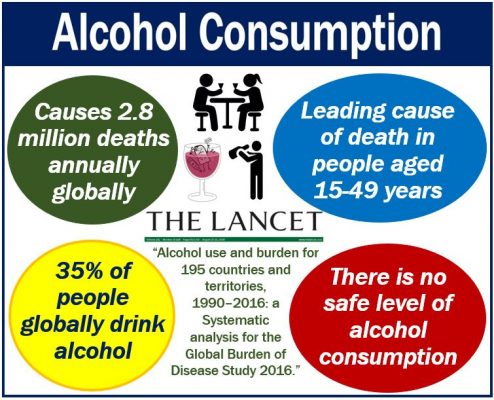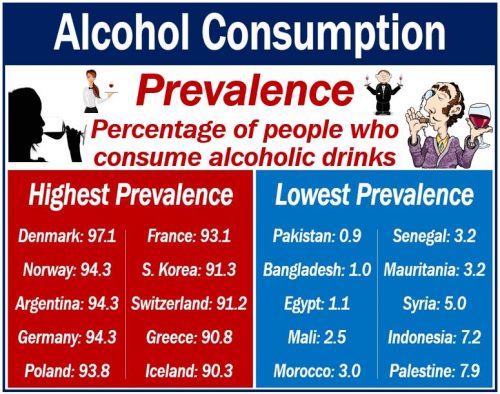Alcohol consumption is associated with 2.8 million deaths annually worldwide, says a Lancet report (citation at the end of this article). Worldwide, one-third of all adults, i.e., 2.4 billion people, drink alcohol.
Death from alcohol consumption is much more common in men than women. Approximately 6.8% of men and 2.2% of women die from alcohol-related health problems annually.
Alcohol consumption and premature death
According to lead author Dr. Max Griswold and colleagues, alcohol consumption is the seventh leading risk factor of premature death and disability globally.
Dr. Griswold is a researcher at the Institute for Health Metrics and Evaluation, University of Washington, USA.
Among people between the ages of fifteen and forty-nine, alcohol use is the leading cause of death. In the 15-49 age group, alcohol consumption is a major cause of road injuries, self-harm, and tuberculosis.
For individuals aged 50+ years, cancers are the leading cause of alcohol-related deaths. Approximately 18.9% and 27.1% of deaths in older men and women respectively are alcohol-related.

No safe level
According to the researchers, there is no safe level of alcohol consumption. The beneficial effects of alcohol against, for example, ischemic heart disease are smaller than its negative consequences. Developing cancer, for example, is a negative consequence of consuming alcohol.
In other words, no matter how little you drink, alcohol consumption is bad for the health, the researchers wrote. Therefore, it is probably better to cut out alcohol use altogether.
Regarding there being no safe minimum level of alcohol intake, the authors wrote:
“The level of alcohol consumption that minimized harm across health outcomes was zero (95% UI 0·0–0·8) standard drinks per week.”
Alcohol consumption – global disease burden
Alcohol use is a substantial cause of health loss, the authors wrote. It is also a leading risk factor for global disease burden.
The researchers found that all-cause mortality rises with increasing levels of consumption. The risk of developing cancers also rise with increasing levels of consumption.

Alcohol consumption policies
The study findings suggest that governments across the world may need to revise their alcohol control policies. The authors suggest that governments should focus on efforts to reduce overall population-level consumption.
At the end of the Lancet article, the authors concluded:
“The widely held view of the health benefits of alcohol needs revising, particularly as improved methods and analyses continue to show how much alcohol use contributes to global death and disability. Our results show that the safest level of drinking is none.”
“This level is in conflict with most health guidelines, which espouse health benefits associated with consuming up to two drinks per day. Alcohol use contributes to health loss from many causes and exacts its toll across the lifespan, particularly among men.”
“Policies that focus on reducing population-level consumption will be most effective in reducing the health loss from alcohol use.”
In a different study, researchers found that raising alcohol taxes was a cost-effective way to reduce the negative consequences of alcohol consumption. Not only do higher alcohol taxes reduce alcohol harms, but they also help improve people’s overall health.
Citation
“Alcohol use and burden for 195 countries and territories, 1990–2016: a systematic analysis for the Global Burden of Disease Study 2016,” GBD 2016 Alcohol Collaborators. The Lancet. Published: August 23, 2018. DOI: 10.1016/S0140-6736(18)31310-2. Open access funded by Bill & Melinda Gates Foundation.

